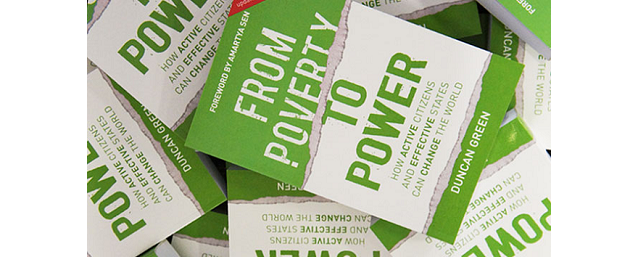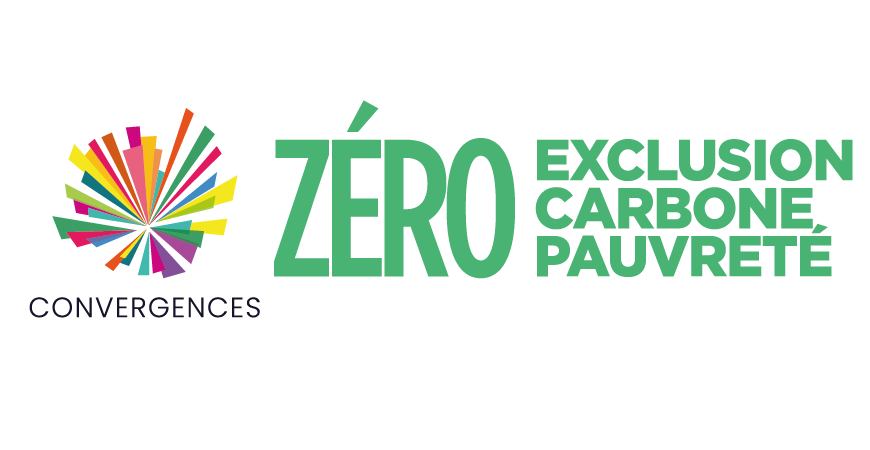From poverty to power is a rich book for people who desire a more comprehensive view on the issue of global poverty.

From Poverty to Power
Duncan Green (Practical Action Publishing, 2012 – 2nd edition)
This book review aims to summarise the opinions of the book’s author and does not necessarily reflect the views ofConvergences nor of the reviewer.
Duncan Green, author of From Poverty to Power and the high-quality blog by the same name, was for many years senior strategic advisor to Oxfam UK. Oxfam is one of the most prestigious NGOs fighting poverty on a global scale and stands out by its particular focus on enhancing and expanding the power of the poor.
Although Green makes it clear that he is not writing as the official voice of Oxfam, this focus on power can naturally be found is his book. Many different aspects of the fight against poverty are addressed, but there is continual emphasis on the idea that poverty is much more than low income: it is a sense of powerlessness, exhaustion, and exclusion from decision-making.
Green rejects the idea that poor people should be passive recipients of charity. Rather, priority is given to helping poor people build up their power.
From this perspective, the author sees effective states and active citizens (citizens exercising their full range of political, civil, and social rights) as playing a crucial role in bringing about genuine human development. Many examples are provided of local communities who – sometimes with Oxfam’s help – have managed to escape poverty through fighting for their rights.
But the role of private companies (called “the third pillar” in the book) is not neglected. A healthy private sector is deemed essential in the fight against poverty, and Green admits that harnessing the dynamism of the private sector can trigger extraordinary development.
His stance towards businesses is to challenge them in a respectful and cooperative but firm way, which is pretty much Oxfam’s position as well (for example, the organization performed an analysis of Unilever’s poverty footprint in Indonesia and launched a stimulating “Behind the Brands” campaign).[1]
This book covers many different aspects of the fight against poverty, including one that is particularly connected with the role of businesses: intellectual property (IP). At first issues regarding patents, trademarks, and copyrights may seem very remote from the life of the poor, but IP plays a crucial role. To the author it is “one of the most glaring examples of the rigged rules and double standards that bedevil the international trade system.” Rich countries consistently use IP to preserve their technological edge and “kick away” the ladder from potential competitors.
At the global level, the present rules on intellectual property as outlined in the Agreement on Trade-Related Aspects of Intellectual Property (TRIPS) – are particularly controversial, especially when applied to the pharmaceutical field. Although more than 10 million people die each year from infectious and parasitic diseases, most of which could be treated with existing medicines, TRIPS rules are used by big pharmaceutical firms to delay the introduction of off-patent generic versions of medicines for as long as possible.
TRIPS initially allowed some flexibility for developing countries to override patent rules to protect public health, but this promptly degenerated into a legal battleground (the most famous case being the one of anti-AIDS drugs in South Africa).
The author doesn’t deny big pharmaceutical companies the right to protect their return on their R&D investment, but argues that different levels of development require different kind of IP rules. He invites them to contribute some of their intellectual property to a patent pool for medicines (and for states to encourage them to do so).
This is a rich book for people who desire a more comprehensive view on the issue of global poverty and also for anyone seeking detailed information about specific poverty-related topics (such as IP rules). The mass of information and the number of pages (490) require an effort, but it is worth it!
[1] About this campaign, see the article “What Makes Big Corporations Decide to Get on the Right Side of History”, published in the Poverty to Power blog in February 2014.
The author of the article: Sebastien Henry
Graduated from ESSEC, entrepreneur in Asia for 10 years and author of four books, Sébastien Henry provides on his blog summaries of inspiring books for a fair and sustainable world (most of these works are not yet translated into French ).
